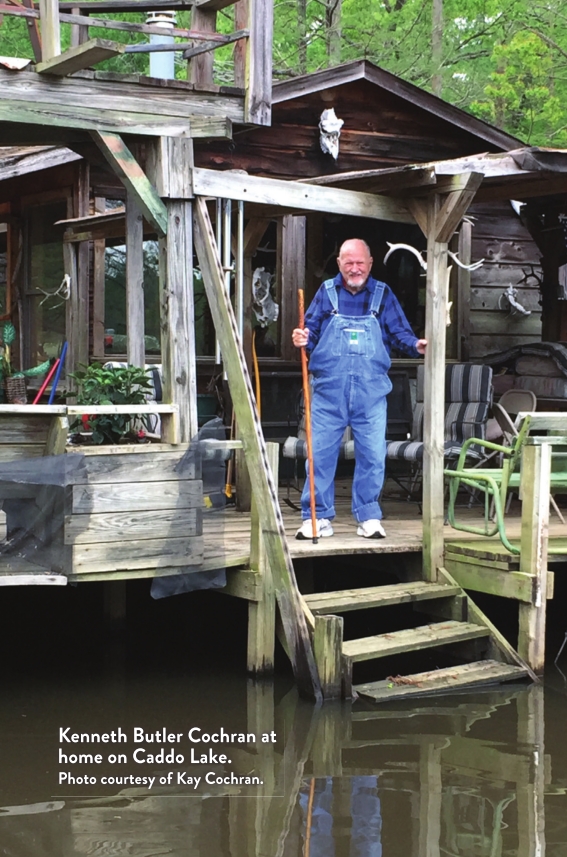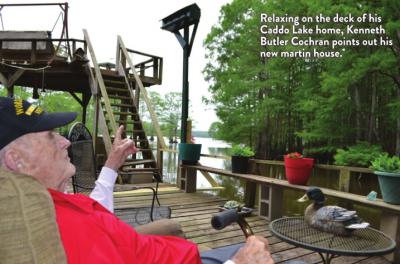
Farm boy, Christian, soldier, educator and author at home on Caddo Lake
In February, Kenneth Butler Cochran celebrated the 100th anniversary of his birth.
 Most days you’ll find him sitting in a chair on his dock looking out at Caddo Lake. “I’ve sat right here, and God’s creation is all around me. I’ve watched the cormorants last week come from Mexico. I watched the wood ducks make a nest right out here. I watched the eagle yesterday dip down out here and catch a fish.”
Most days you’ll find him sitting in a chair on his dock looking out at Caddo Lake. “I’ve sat right here, and God’s creation is all around me. I’ve watched the cormorants last week come from Mexico. I watched the wood ducks make a nest right out here. I watched the eagle yesterday dip down out here and catch a fish.”
But lest you think Ken Cochran has led a life of nature-watching, you should know that he spent 35 years working for the Caddo Parish school system. But that didn’t happen until after he’d had a stint in the Army Air Corps in World War II. And that was after he'd worked his younger years on a farm in rural Louisiana during the Depression.
“I grew up on a little farm out of Vivian near Jeems Bayou. The greatest thing that God did for me is that he put me in a Christian family on a farm in a recession. We had to work hard to make ends meet. It all started with my mother, who was a devoted Christian. They carried me to church when I was a kid, and by the time I was out of high school, I was preaching sermons and teaching Sunday school classes.”
It was also during his youth that some friends brought arrowheads to school and sparked Cochran’s interest in the native culture.
“I can recall so vividly, when I was very young, old Tom Williams over there on the bluff told us these stories. The Indians were going and coming; this was their pathway. That got me into archeology. I eventually got associated with Frank Schambach. Dr. Schambach [who was resident archeologist of the Arkansas Archeological Survey’s research station at Southern Arkansas University] was recognized as one of the early authorities. I had the privilege of going out with him on digs. The Caddo Indians, the Kadohadacho, made up of 24 tribes that have always occupied the Red River Valley. They ranged from Texarkana to Natchitoches.” Cochran’s interest in the Caddoan culture resulted in the publication of his book, “Native Americans of Caddo Lake.”
But lest you think Ken Cochran is an ivory tower intellectual, “I'm just a country boy. I never was a brilliant student. My first-grade teacher failed me and said I was too immature." Education was a struggle according to Cochran, and coming up during the Depression, other things may have taken priority – like making ends meet. "All of us had to work to make ends meet. Growing up, I chopped cotton in the river bottoms for 75 cents a day. We didn’t have everything we wanted to eat, but we had something to eat.
“I graduated from high school after a good deal of effort,” he said with a chuckle. “I went to
Louisiana Tech. My mother wanted me to go to college. I worked all my
four years there. I finally got out of there with a B.A. degree, and who
was waiting on me but the recruiter. We had just had Pearl Harbor; we
were entering the war."
He
was commissioned after three months of officer candidate training; he
went to flight school and was shipped to the European theatre. But not
before he married. “I ended up marrying three country girls. All
Christians. They have been the backbone of my life.” Cochran has
outlived them all.
 But
lest you think Ken Cochran would be just another youngster serving his
country during wartime, “I went through three years as a combat pilot in
B-17s, B-24s and P-40s. I went through five invasion campaigns in the
central Pacific. I became an operations officer with the 98th Bomb Squad
and was promoted to captain.”
But
lest you think Ken Cochran would be just another youngster serving his
country during wartime, “I went through three years as a combat pilot in
B-17s, B-24s and P-40s. I went through five invasion campaigns in the
central Pacific. I became an operations officer with the 98th Bomb Squad
and was promoted to captain.”
Like
the thousands of GIs returning from Europe and the Pacific, Cochran
came home to restart his life. "I don't understand it, but God just kept
on giving me opportunities. When I got back from the war, I had all
kinds of opportunities.”
The
first came from a lady who was assistant superintendent of Caddo
Schools named Elizabeth Taylor. With Cochran's experience, she said he
could become a school principal if he got a master's degree. So, he went
to George Peabody College in Nashville, Tenn., and got the sheepskin.
"I
was assigned to Ida, La. Worked there for four years, and then A.C.
Steere School opened up. Ms. Taylor said how about going to A.C. Steere
and being an elementary principal? I was at the right place at the right
time. I have to count that to the Lord.”
From
there, he moved to Broadmoor Junior High, but opportunity came calling
again. "The superintendent called me one day and said we're going to
open a brand new school down there in a cotton patch south of
Shreveport. Do you want to take a shot at that? So, I became the
principal of Youree Drive Junior High School. I stayed there (for) 14
years."
His next opportunity came in helping establish Shreve Christian School, known today as Evangel Christian Academy.
Ken
Cochran was not focused solely on education. "I got together with
Horace Hampton, who was assistant postmaster in Shreveport. He had a
group of missionaries that went into small churches in south Louisiana
and Arkansas. So, he got me involved. We started little churches. I was a
roving minister, preaching. I ended up baptizing a lot of people. I
preached a lot of funerals. I was busy all the time."
After a life lived at such a pace, the tranquil life of Caddo Lake would seem like paradise.
"My
biggest adjustment right now is doing nothing. I came out here day
before yesterday, and I started building a workbench. When I graduated
from Louisiana Tech, I had a hive of bees and a setter bird dog. And
until recently, I’ve never been without a good bird dog and a hive of
bees. I had 40 hives of bees at one time. That’s how I made a little
extra money. I never did have a lot of money, but that wasn’t my
philosophy. I never went hungry, ever. I’ve always been blessed all of
my life.”
A person
with this much life experience has a lot to offer in the advice
department. “Don’t buy on the credit. I owned trucks and cars and
motorhomes, but I’ve never bought one on credit. I never have been in a
sweat about money. I’ve never smoked. I have never drunk a beer. I have
never been drunk. I have regular checkups. That sentence tells you why
I’m a hundred.”
Sitting
on the dock listening to frogs croak, birds sing, and the lap of water
gently against the pilings seems like just reward. But does he recommend
this life to others? “When you get up to be in the 90s, late 80s,
you’re going to have conditions which are really uncomfortable. But I’m
not in any sharp pain, so I find myself still happy. I would love to be
young again, but that’s a dream. Would I do it any differently? I could
improve on a lot of things, but by and large, I’m not complaining about
my life.”
But in case
you think Ken Cochran is merely wool-gathering, “It could be so much
worse. It wouldn’t be real hard for me to have this virus. But I’m
trying to behave. I stay out here in the fresh air. I keep my distance. I
do enjoy the past. It does bring back a lot of good memories.”
And isn’t that what living 100 years should be all about?